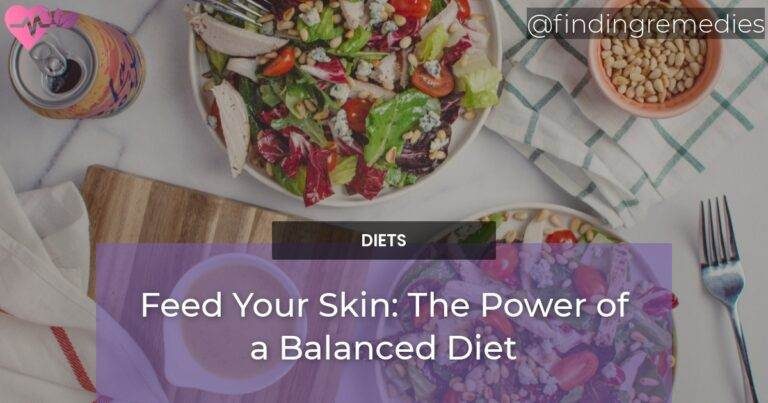A balanced diet can have a significant impact on your skin health. The nutrients you consume play a crucial role in maintaining healthy skin, while certain foods can harm your skin.
In this article, we will discuss the role of nutrients, hydration, antioxidants, omega-3 fatty acids, and other factors on skin health. A well balanced diet for a healthy skin in an all essential need.
Table of Contents
Role of Nutrients in Skin Health
Nutrients are essential for the growth, repair, and maintenance of healthy skin. The following are some of the essential nutrients for healthy skin:
- Vitamin E: helps in protecting the skin from damage caused by UV radiation and improves collagen production.
- Vitamin C: plays a significant role in collagen production and has anti-inflammatory properties.
- Probiotics: help in maintaining a healthy gut, which is crucial for skin health.
- Phytonutrients and carotenoids: protect the skin from environmental damage and inflammation.
- Zinc, selenium, copper, and sulfur: help in collagen production and cell repair.
- Polyphenols and bioactive peptides: have antioxidant and anti-inflammatory properties.
Incorporating these nutrients into your diet can help promote healthy skin.
Importance of Hydration
Drinking enough water is essential for healthy skin. Dehydration can cause dryness, flakiness, and premature aging of the skin. Drinking water helps in:
- Keeping the skin hydrated
- Improving collagen production
- Removing toxins from the body
It is recommended to drink at least 8 glasses of water per day to maintain healthy skin.
Foods that Promote Skin Health
The following are some of the foods that can improve skin health:
- Fruits and vegetables: rich in vitamins, minerals, and antioxidants that protect the skin from environmental damage and inflammation.
- Fatty fish: rich in omega-3 fatty acids, which help in reducing inflammation and improving collagen production.
- Nuts and seeds: rich in zinc, selenium, and vitamin E, which help in protecting the skin from damage caused by UV radiation.
- Green tea: rich in antioxidants that protect the skin from environmental damage.
Incorporating these foods into your diet can help promote healthy skin.
ALSO READ
Foods that Harm Skin Health
The following are some of the foods that can harm skin health:
- Sugar: can cause inflammation, which can lead to acne and premature aging of the skin.
- Processed foods: can cause inflammation and increase the risk of acne and other skin conditions.
- Dairy: can cause inflammation and increase the risk of acne and other skin conditions.
Avoiding or limiting these foods can help maintain healthy skin.
Role of Antioxidants in Skin Health
Antioxidants are compounds that help in protecting the skin from environmental damage and inflammation. The following are some of the antioxidant-rich foods that can improve skin health:
- Fruits and vegetables: rich in vitamins, minerals, and antioxidants that protect the skin from environmental damage and inflammation.
- Green tea: rich in antioxidants that protect the skin from environmental damage.
- Dark chocolate: rich in flavonoids that protect the skin from UV damage.
Incorporating these foods into your diet can help promote healthy skin.
Impact of Sugar and Processed Foods on Skin Health
Sugar and processed foods can have a negative impact on skin health. Consuming too much sugar can cause inflammation, which can lead to acne and premature aging of the skin. Processed foods can cause inflammation and increase the risk of acne and other skin conditions.
Effect of Alcohol and Caffeine on Skin Health
Consuming too much alcohol can have a negative impact on skin health. It can cause dehydration, inflammation, and premature aging of the skin. Caffeine consumption can cause dehydration and increase the risk of acne and other skin conditions.
Role of Omega-3 Fatty Acids in Skin Health
Omega-3 fatty acids are essential for healthy skin. They help in reducing inflammation and improving collagen production. The following are some of the Omega-3 rich foods that can improve skin health:
- Fatty fish: rich in omega-3 fatty acids.
- Chia seeds: rich in omega-3 fatty acids.
- Walnuts: rich in omega-3 fatty acids.
Incorporating these foods into your diet can help promote healthy skin.
ALSO READ
Importance of Limiting Dairy and Animal Products
Dairy and animal products can have a negative impact on skin health. They can cause inflammation and increase the risk of acne and other skin conditions. Some alternatives to dairy and animal products include:
- Plant-based milk: almond milk, soy milk, coconut milk
- Plant-based protein: lentils, chickpeas, tofu
- Vegetables and fruits
Reducing dairy and animal products can help maintain healthy skin.
Impact of a Balanced Diet on Reducing Acne
A balanced diet can help in reducing acne. Consuming foods that are rich in nutrients, antioxidants, and omega-3 fatty acids can help reduce inflammation, improve collagen production, and promote healthy skin. The following are some of the foods that can help reduce acne:
- Green leafy vegetables
- Fatty fish
- Nuts and seeds
- Tomatoes
- Berries
Modifying your diet to include these foods can help in reducing acne.
Note: This article is not medical advice and should not be used as a substitute for professional medical advice. As with any health concerns, it is important to consult with a healthcare professional before making any significant changes to your diet or lifestyle.
Conclusion
In conclusion, eating a balanced diet is important for your skin health. Eating a variety of whole, unprocessed foods and avoiding processed foods, sugar, and unhealthy fats can help you maintain healthy skin. Eating plenty of fruits and vegetables, lean proteins, and healthy fats can help keep your skin looking and feeling its best. Taking daily supplements, drinking plenty of water, and limiting your alcohol intake can also help you maintain healthy skin. A balanced diet is essential for skin health, so make sure you feed your skin the nutrients it needs.
RELATED ARTICLES:

